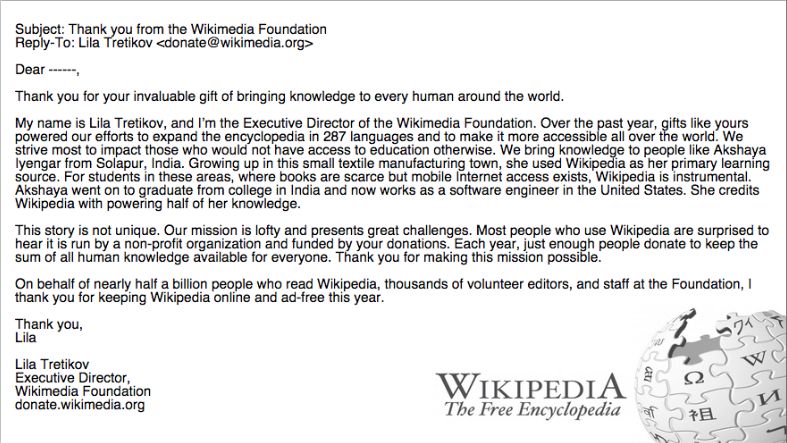Fundraising Tips: How to Get Yourself to Ask for Contributions Every Day
by Andrea Kihlstedt
Lauren Phipps, Major Gifts Officer at the New York Civil Liberties Union, had just been assigned a portfolio of more than 200 donors and it was her job to raise money from them. When I met with her, she was very excited. She said that she didn’t know many of people on her list, but that she was planning to make a fundraising call a day–every day–to get to know them better.
Lauren Phipps Has a Portfolio of Donors
When I checked in with Lauren again recently, she told me that even with the best of intentions she’s had trouble keeping up the pace of asking for donations every day. It’s been hard to manage her time and put asking front and center.
That got me thinking about the things that might help Lauren (or you for that matter) actually maintain the discipline to ask for gifts every day.
No matter how good your intentions, if you’re a lone ranger in an office that doesn’t know how important asking for gifts is, you’ll probably find it hard to muster the discipline and energy it takes to ask for gifts every week let alone every day.
But if everyone in your organization gets behind that work and supports it fully, you’ll find it much easier to keep it up.
5 Ways You Can Make it Easier to Ask for Gifts
These five tips will support you in asking for gifts so you’ll find it hard not to ask!
- Spend time with your colleagues setting personal asking goals and then reporting to one another on your progress at the end of the week.
- Let your supervisor know how important that work is and ask for her support. Imagine how good it would feel if she took the time and attention to ask you how your donor calls are going.
- Find a more experienced fundraiser to mentor you so when a call seemed off or you weren’t quite sure how to approach a particular donor, you could talk these through with a mentor.
- Track the number of in-person calls and visits you had with donors each week. Post your results prominently in your office. If you can, get your colleagues to do the same.
- With your most important donors, get someone to sit with you while you make the calls so you can discuss them in advance and debrief how each of them went afterwards.
In the video below, Lauren describes how the development staff in her organization supports her Executive Director’s work with donors. She says it works like a charm!
Lauren Phipps Helps Her Executive Director Make Donor Calls.
Approaching your work with donors with the help and encouragement of others in your office will give you the courage, discipline and energy to ask donors for contributions every day. And with that sort of laser focus on asking, you will raise more money.
Authenticity in Fundraising: Being a Great Fundraiser While Still Being YOU
by Andrea Kihlstedt
 Who is the Authentic You? Can You Be A Great Fundraiser As Your Authentic Self?
Who is the Authentic You? Can You Be A Great Fundraiser As Your Authentic Self?
If you’re a front line solicitor, often meeting with donors in person to ask them for gifts, you might sometimes wonder who you really are.
When you meet with someone conservative, you’re conservative. When you meet with a progressive, you’re progressive.
When you meet with a Cornell professor, you wear Birkenstocks. The next day with the banker, it’s heels and stockings.
When someone waxes eloquent about a political figure they support, you nod sagely but then vote for the other guy.
Today you’re for gun control, tomorrow you’re a supporter of the NRA.
In the heat of the last presidential election, I went to visit a major donor on behalf of a client. It turned out that she was a Republican and felt quite strongly about the outcome of the election. And as she walked me to my car and stood watching me depart, I was painfully aware of the Democratic sticker on my rear bumper.
Was it a mistake to drive a car with a political sticker?
Do you have to sell out to be a good major gift solicitor? Do you have to become vanilla? Or can you show your true colors?
Do You Wear Brightly Colored Socks?
My friend Dave Dunlop, who developed the famed major and principal gifts program for Cornell University, once told me that Si Seymour, the granddaddy of major gift fundraising instructed young fundraisers at Cornell not to wear bright colored socks! Why? Because they would call attention to themselves by doing so.
I confess to being partial to brightly colored socks. Should I reform my ways? Was the great Si Seymour wrong?
Do you have to give up your identity be a great major gift fundraiser?
Does it pay to pretend to be like your donor?
I’ve come to the conclusion that it doesn’t pay to pretend to be like your donors. Even when you try, you’re not likely to succeed. It’s more important just to be yourself.
Now does that mean wearing your most outrageous outfit? Or letting loose with an F-bomb because you do that sometimes in other circumstances? No, of course not.
Follow these simple simple suggestions and you’ll find that your conversations will be more authentic and more rewarding than when you pretend you’re someone you’re not.
How to Ask for Gifts While Being the Authentic YOU
- Your major donor conversations should be all about the donor. If you’re curious about who the donor is and what they value; if you make it your job to understand and help them achieve their goals, they won’t care a hoot if you are wearing bright socks or gold necklaces or Birkenstocks. They won’t even care if you agree with them politically or are in their socio-economic group. They’ll just feel good that someone who is genuinely interested in them has come to visit.
- Don’t argue, but don’t lie. If you are visiting a donor whose views are diametrically opposed to your own, resist the urge to “take the donor on.” If they ask about your views, share them. But a visit with a major donor, unless you know your donor enjoys a good debate, is not a time to argue for your views. It’s not even a time to show how smart and well-informed you are. It’s simply time for you to wonder about the donor. Because the visit is All About the DONOR.
- Substitute curiosity for judgement. Curiosity is the primary skill of a great major gift fundraiser. When you’re genuinely curious rather than judgmental, you’ll find yourself enjoying the company of people who are very different from you.
- Resist the urge to make fun of your donors. When you are talking to colleagues, discipline yourself not speak ill of your donors. It may be that you just met with a donor who has blue hair and rouge-pink cheeks and whose ideas seem cockamaimie to you, but you’ll do better at fundraising–and in your life–if you choose to share stories about her generosity or spirit or good humor rather than smiling to her face and laughing behind her back.
- Get out. Finally, If you find yourself unable to enjoy conversations with people who don’t agree with your views and who live in ways you don’t approve of; if you find yourself demeaning the very donors you are building relationships with, it’s time to get out of this business.
And now, if you’ll excuse me, I’m off to buy some more brightly colored socks.
How far will you go to be like your donors? Let us know your thoughts on Twitter and Facebook.
Fundraising Tips: Do You have a Weekly Donor-Touch Day?
by Andrea Kihlstedt
 Like you, I’ve been reading a lot about the dire donor retention stats. Or, better put, the statistics about fleeing donors. It’s as clear as day that getting a new donor costs more than the donor is likely to give!
Like you, I’ve been reading a lot about the dire donor retention stats. Or, better put, the statistics about fleeing donors. It’s as clear as day that getting a new donor costs more than the donor is likely to give!
The good news: I’ve got a simple suggestion for you!
Set aside one day every week for reaching out and communicating with your top 50 donors and anyone else you have identified as someone who might realistically move into that group.
Imagine this: Every Wednesday from the time you start work until the time you close up for the day you do only one thing: reach out to your major donors.
- You call to schedule meetings with them.
- You send personal emails to them with the most recent photos of someone you’ve helped.
- You follow up on your last meeting with someone.
- You send flowers to a donor whose birthday is coming up.
- You deliver chocolate chip cookies to the people who have made the biggest difference to your organization.
- You write a personal thank you email or note to a donor who has touched your heart.
- You meet with someone to ask for a gift.
Make Every Wednesday Donor Day
You literally fill your Wednesdays with major donor work. It’s front and center for that entire time.
Commit One Day Per Week to “Donor Day” and Here Is What Will Likely Happen
- You’ll spend the rest of the week making sure you’re set up for your major donor day.
- Your donors will start to feel appreciated.
- You’ll get to know your donors better–much better.
- They’ll start making more and bigger gifts to your organization.
- Your colleagues will get used to not asking you to do anything else on Wednesdays.
- You’ll have more fun, and
- You will raise more money for your organization
Try it out for 2 months; that’s eight Wednesdays. Let us know what happens.
Have some ideas for what you’ll do on your donor day? Share it with us in the comments or on Facebook or Twitter.
By the way, did you know that in Sweden for many years everyone…I mean EVERYONE…ate yellow pea soup for supper on Thursdays? No matter where you went, that’s what you’d eat. It created an expectation and a comfort and perhaps even a sense of national identity.
Three Tips to Make Your Fundraising Thank You Letters Work – With Thanks to Wikipedia
by Andrea Kihlstedt
 This morning I made a small contribution to Wikipedia on line. I was looking something up and a little red banner at the top of the page reminded me that Wikipedia is run by a nonprofit and raises money so it doesn’t have to include ads or other sorts of commercial distractions to its pages. Yes, I thought. I use Wikipedia all the time, I’ll make a gift.
This morning I made a small contribution to Wikipedia on line. I was looking something up and a little red banner at the top of the page reminded me that Wikipedia is run by a nonprofit and raises money so it doesn’t have to include ads or other sorts of commercial distractions to its pages. Yes, I thought. I use Wikipedia all the time, I’ll make a gift.
Transacting the gift took me all of 30 seconds through PayPal and as soon as I finished making the gift, the thank you letter below was in my email in-box.
Nonprofits have lots to learn from Wikipedia’s about saying thank you. It’s not fancy–no pictures, no glam or glitz. But it works. Here’s why.
1. Your Thank You Letters should be IMMEDIATE!
The thank you letter could not have been more immediate! It arrived one second after I made the gift! So the thank you arrived when the gift was still very fresh in my mind.
2. Your Thank You Letters Should Feel Personal
I know full well that the thank you is an auto-response, but nonetheless it feels personal. It looks just like a letter I might get through regular mail and it’s addressed to me, Andrea. Funny how that makes difference even when I know it’s automatic. But it does!
3. Your Thank You Letters Should Pass the YOU Test.
The Wikipedia letter below contains the words you or your TWENTY FIVE times. Count ’em. And every time my brain reads that word it reacts positively. So does yours!
The Wikipedia thank-you letter below gets it right. Do you?
Paul Jolly, Jump Start Growth, Fundraising Consultant
See more from Paul – watch his video on asking for the first time.
For more on overcoming asking anxiety, watch this video by Katherine Greenleaf.
Follow our suggestions on Dealing with Asking Anxiety. Note, this is a members only section of the site. Not a member yet? Join NOW.





